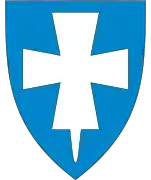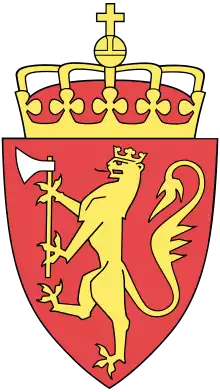Rogaland
Rogaland [ˈrûːɡɑlɑn] (![]() listen) is a county in Western Norway, bordering the North Sea to the west, and counties Vestland to the north, Vestfold og Telemark to the east, and Agder to the east and southeast. The administrative centre of the county is the city of Stavanger, which is one of the largest cities in Norway.
listen) is a county in Western Norway, bordering the North Sea to the west, and counties Vestland to the north, Vestfold og Telemark to the east, and Agder to the east and southeast. The administrative centre of the county is the city of Stavanger, which is one of the largest cities in Norway.
Rogaland fylke | |
|---|---|
 Flag | |
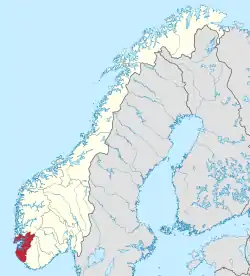 Rogaland within Norway | |
| Coordinates: 59°N 06°E | |
| Country | Norway |
| County | Rogaland |
| Region | Vestlandet |
| County ID | NO-11 |
| Established | 1662 |
| Administrative centre | Stavanger |
| Government | |
| • Acting Governor | Lone Merethe Solheim |
| • County mayor | Marianne Chesak (Ap) |
| Area | |
| • Total | 9,377.10 km2 (3,620.52 sq mi) |
| • Land | 8,575.33 km2 (3,310.95 sq mi) |
| • Water | 801.77 km2 (309.57 sq mi) |
| Area rank | #10 in Norway, 2.9% of Norway's land area |
| Population (2020) | |
| • Total | 479,892 |
| • Rank | 4 (8.9% of country) |
| • Density | 51/km2 (130/sq mi) |
| • Change (10 years) | 12.1% |
| Demonym(s) | Rogalending |
| Time zone | UTC+01:00 (CET) |
| • Summer (DST) | UTC+02:00 (CEST) |
| Official language form | Neutral |
| Income (per capita) | 155,000 kr (€20,000) |
| GDP (per capita) | 267,000 kr (€34,000) (2008) |
| GDP national rank | 4 (6.63% of country) |
| Website | www |
Rogaland is the center of the Norwegian petroleum industry. In 2016, Rogaland had an unemployment rate of 4.9%, one of the highest in Norway.[2] In 2015, Rogaland had a fertility rate of 1.78 children per woman, which is the highest in the country.[3]
The Diocese of Stavanger for the Church of Norway includes all of Rogaland county.
Etymology
Rogaland is the region's Old Norse name, which was revived in modern times. During Denmark's rule of Norway until the year 1814, the county was named Stavanger amt, after the large city of Stavanger. The first element is the plural genitive case of rygir which is probably referring to the name of an old Germanic tribe (see Rugians). The last element is land which means "land" or "region". In Old Norse times, the region was called Rygjafylki.[4]
Coat of arms
The coat of arms is modern; it was granted on 11 January 1974. The arms are blue with a white or silver pointed cross in the centre. The cross is based on the old stone cross in Sola, the oldest national monument in Norway. It was erected in memory of Erling Skjalgsson after his death in 1028. This type of cross was very common in medieval Norway.[5]
Geography
Rogaland is mainly a coastal region with fjords, beaches, and islands, the principal island being Karmøy. The vast Boknafjorden is the largest bay, with many fjords branching off from it.
Stavanger/Sandnes, the third-largest urban area of Norway, is in central Rogaland and it includes the large city of Stavanger and the neighboring municipalities of Sandnes, Randaberg, and Sola. Together, this conurbation is ranked above the city Trondheim in population rankings in Norway.
There are many cities/towns in Rogaland other than Stavanger and Sandnes. They include Haugesund, Egersund, Sauda, Bryne, Kopervik, Åkrehamn, and Skudeneshavn.
Karmøy has large deposits of copper (some from the Visnes mine was used in the construction of the Statue of Liberty).[6] Sokndal has large deposits of ilmenite. Rogaland is the most important region for oil and gas exploration in Norway, and the Jæren district in Rogaland is one of the country's most important agricultural districts.
History
There are remains in Rogaland from the earliest times, such as the excavations in a cave at Viste in Randaberg (Svarthola). These include the find of a skeleton of a boy from the Stone Age. Various archeological finds stem from the following times, the Bronze Age and the Iron Age. Many crosses in Irish style have been found. Rogaland was called Rygjafylke in the Viking Age. Before Harald Fairhair and the Battle of Hafrsfjord, it was a petty kingdom. The Rugians were a tribe possibly connected with Rogaland.
Culture and tourism
A series of festivals and congresses of international fame and profile are arranged, such as The Chamber Music Festival, The Maijazz Festival, The Gladmat (lit. food with a happy smile) Festival, and The ONS event, which has been held in Stavanger every second year since 1974. The ONS is a major international conference and exhibition with focus on oil and gas, and other topics from the petroleum industry. The Concert Hall and Music Complex at Bjergsted and the Stavanger Symphony Orchestra provide important inspiration in the Norwegian musical environment. Another annual event in Stavanger is The World Tour Beach Volleyball. During this tournament, the downtown is converted into a beach volleyball arena.
Rogaland is home to many natural wonders, like Prekestolen, Kjerag and Gloppedalsura. In Stavanger, there is an archeological museum with many artifacts from early history in Rogaland. An Iron Age farm at Ullandhaug in Stavanger is reconstructed on the original farm site dating back to 350–500 AD. The Viking Farm is a museum at Karmøy.
Government
A county (fylke) is the chief local administrative area in Norway. The whole country is divided into 11 counties. A county is also an election area, with popular votes taking place every 4 years. In Rogaland, the government of the county is the Rogaland County Municipality. It includes 47 members who are elected to form a county council (Fylkesting). Heading the Fylkesting is the county mayor (fylkesordførar). Since 2020, the Rogaland County Municipality has been led by Marianne Chesak, the county mayor.
The county also has a County Governor (fylkesmann) who is the representative of the King and Government of Norway. Lone Merethe Solheim is the acting County Governor of Rogaland until 2021 when Bent Høie takes over the role.
The municipalities in Rogaland are divided among several district courts (tingrett): Dalane District Court, Haugaland District Court, Jæren District Court, and Stavanger District Court. All of these courts are subordinate to the Gulating Court of Appeal district based in Bergen.
Subdivisions
Municipalities
Rogaland County has a total of 23 municipalities:[7][8]
| Municipal Number | Name | Adm. Centre | Location in the county | Established | Includes (former municipalities) |
|---|---|---|---|---|---|
| 1101 | Egersund | 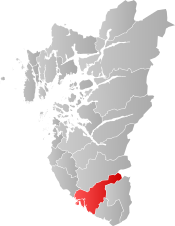 | 1 Jan 1965 | 1101 Egersund 1113 Heskestad (part) 1115 Helleland | |
| 1103 | Stavanger | 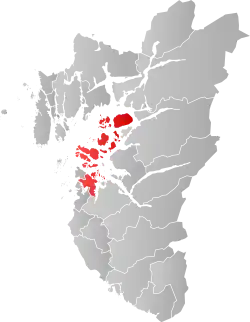 | 1 Jan 1838 | 1124 Håland (part) 1125 Madla 1126 Hetland (part) 1132 Fister (part) 1133 Hjelmeland og Fister (part) 1140 Sjernarøy 1141 Finnøy 1142 Rennesøy | |
| 1106 | Haugesund | 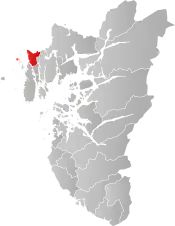 | 1 Jan 1855 | 1152 Torvastad (part) 1153 Skåre | |
| 1108 | Sandnes | 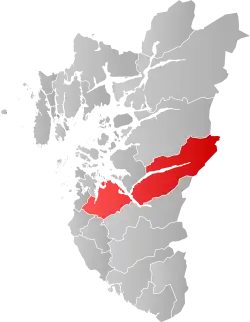 | 1 Jan 1838 | 1123 Høyland 1126 Hetland (part) 1128 Høle (part) 1129 Forsand (part) | |
| 1111 | Hauge | 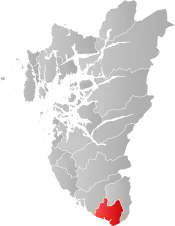 | 1 Jan 1838 | 1107 Sogndal | |
| 1112 | Moi | 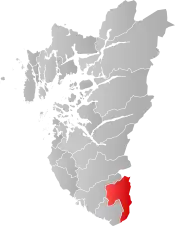 | 1 Jan 1838 | 1113 Heskestad (part) | |
| 1114 | Vikeså | 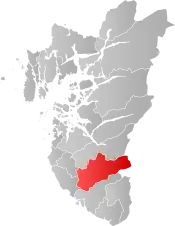 | 1 Jan 1838 | ||
| 1119 | Varhaug |  | 1 Jan 1964 | 1117 Ogna 1118 Varhaug 1119 Nærbø | |
| 1120 | Kleppe | 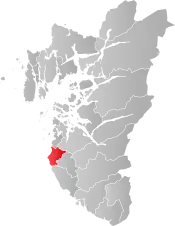 | 1 Jan 1838 | ||
| 1121 | Bryne | 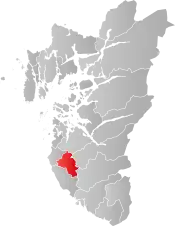 | 1 Jan 1838 | ||
| 1122 | Ålgård | 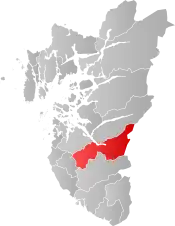 | 1 Jan 1838 | 1128 Høle (part) | |
| 1124 | Solakrossen | 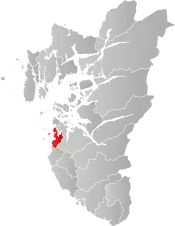 | 1 Jan 1930 | 1124 Håland (part) | |
| 1127 | Randaberg | 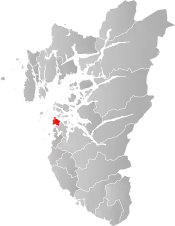 | 1 July 1922 | ||
| 1130 | Jørpeland | 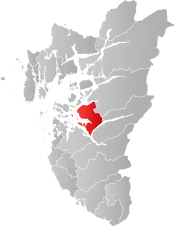 | 1 Jan 1838 | 1129 Forsand (part) | |
| 1133 | Hjelmelandsvågen | 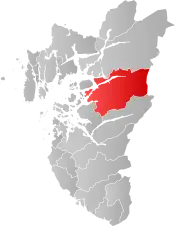 | 1 July 1884 | 1131 Årdal 1132 Fister (part) 1133 Hjelmeland og Fister (part) | |
| 1134 | Sand | 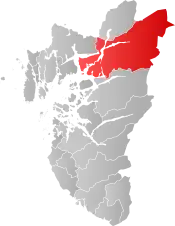 | 1 Jan 1838 | 1136 Sand 1137 Erfjord 1138 Jelsa 1156 Imsland (part) | |
| 1135 | Sauda |  | 1 Jan 1842 | ||
| 1144 | Ydstebøhamn | 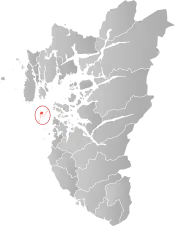 | 1 Jan 1923 | ||
| 1145 | Føresvik | 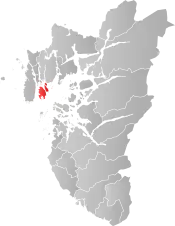 | 1 Jan 1849 | ||
| 1146 | Aksdal | 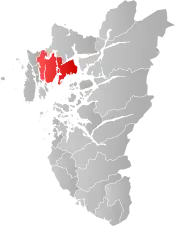 | 1 Jan 1849 | 1139 Nedstrand 1147 Avaldsnes (part) 1154 Skjold (part) | |
| 1149 | Kopervik | 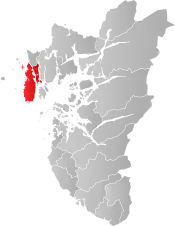 | 1 Jan 1965 | 1104 Skudeneshavn 1105 Kopervik 1147 Avaldsnes (part) 1148 Stangaland 1149 Åkra 1150 Skudenes 1152 Torvastad (part) | |
| 1151 | Utsira | 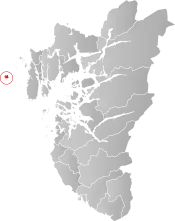 | 1 July 1924 | ||
| 1160 | Ølensjøen | 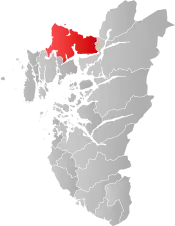 | 1 Jan 1965 | 1154 Skjold (part) 1155 Vats 1156 Imsland (part) 1157 Vikedal 1158 Sandeid 1159 Ølen |
Districts
Cities
Parishes
- Askøy (Askø)
- Avaldsnes
- Bjerkreim
- Bokn (Bukken)
- Bore
- Bø
- Domkirken, Stavanger
- Egersund
- Erfjord
- Falnes
- Ferkingstad
- Finnøy (Hesby)
- Fister
- Forsand (Fossan)
- Frue, see Hetland
- Førdesfjorden
- Gjestal
- Haugesund
- Hausken
- Helleland
- Hesby
- Heskestad
- Hetland
- Hjelmeland
- Hvidingsø
- Høgsfjord
- Høle
- Høyland
- Hå
- Håland
- Imsland
- Jelsa (Jelsø)
- Klepp
- Kopervik
- Kvitsøy (Hvidingsø)
- Lund
- Lye
- Madla
- Malle, see Madla
- Mosterøy
- Nedstrand (Hinderå)
- Norheim
- Nærbø
- Nærem
- Ogna
- Orre
- Randaberg (Randeberg)
- Rennesøy
- Riska (Riskekvernen)
- Røldal (in Hordaland after 1848)
- Sand
- Sandeid
- Sandnes
- Sankt Johannes, Stavanger
- Sankt Petri, Stavanger
- Saude (Sauda)
- Sjernarøy
- Skjold
- Skudenes
- Skudeneshavn
- Skåre
- Sokndal
- Sola (Sole)
- Soma
- Stavanger
- Strand
- Suldal
- Sørbø
- Talgøy (Talgje)
- Tananger
- Time (Lye)
- Tjora
- Torvastad (Torvestad)
- Tysvær
- Utsira
- Utstein Kloster
- Varhaug
- Vats
- Vedavågen
- Vikedal
- Vår Frue, see Hetland
- Åkra
- Åkra (old)
- Åna-Sira
- Årdal
- Egersund Branch (LDS, 1899-1913)
- Haugesund Branch (LDS, 1905-1950)
- Stavanger Branch (LDS, 1850-1938)
- Stavanger (Dissentermenigheter: Stavanger, Klepp, and Haugesund 1859-1903)
- Stavanger (Vennenes Samfund- Quakers, 1821-1951)
Villages
- Aksdal
- Amdal
- Askje
- Åkrehamn
- Åmøy
- Avaldsnes
- Bjerkreim
- Bjoa
- Bore
- Bru
- Brusand
- Dirdal
- Dueland
- Eik
- Eike
- Erfjord
- Ferkingstad
- Feøy
- Figgjo
- Fiskå
- Fister
- Fogn
- Forsand
- Foss-Eikeland
- Frafjord
- Føresvik
- Førre
- Gjesdal
- Gilja
- Grinde
- Grødem
- Hauge i Dalane
- Hellandsbygd
- Helleland
- Hellvik
- Hervik
- Hesby
- Heskestad
- Hestnes
- Hindaråvåg
- Hjelmelandsvågen
- Hommersåk
- Hundvåg
- Hæen
- Høle
- Hålandsmarka
- Hålandsosen
- Idse
- Imslandsjøen
- Innbjoa
- Jelsa
- Judaberg
- Jøsenfjorden
- Klepp stasjon
- Kleppe
- Krossberg
- Kvernaland
- Li
- Lyefjell
- Lysebotn
- Marvik
- Moi
- Mossige
- Nedstrand
- Nesflaten
- Norheim
- Nærbø
- Oanes
- Obrestad
- Ogna
- Oltedal
- Orre
- Pollestad
- Randaberg
- Rekefjord
- Røvær
- Sand i Ryfylke
- Sandeid
- Sandve
- Saudasjøen
- Sirevåg
- Sjernarøyane
- Skjold
- Skjoldastraumen
- Sogndalsstrand
- Solakrossen
- Stenebyen
- Stronda
- Suldalsosen
- Susort
- Sviland
- Sør-Hidle
- Sørbø
- Sørnes
- Talgje
- Tau
- Torvastad
- Tysværvåg
- Undheim
- Varhaug
- Vassøy
- Vatne i Sandnes
- Vatne i Vindafjord
- Veavågen
- Verdalen
- Vigrestad
- Vikebygd
- Vikedal
- Vikeså
- Vikevåg
- Visnes
- Voll
- Vormedal
- Yrke
- Ydstebøhamn
- Ølensjøen
- Ølensvåg (Ølsvågen)
- Øvrebygd
- Ålgård
- Åna-Sira
- Årdal i Ryfylke
Former Municipalities
- Avaldsnes
- Egersund
- Erfjord
- Finnøy
- Fister
- Forsand
- Helleland
- Heskestad
- Hetland
- Hjelmeland og Fister
- Høle
- Høyland
- Håland
- Imsland
- Jelsa
- Kopervik
- Madla
- Nedstrand
- Nærbø
- Ogna
- Rennesøy
- Sand
- Sandeid
- Sjernarøy
- Skjold
- Skudenes
- Skudeneshavn
- Skåre
- Sogndal
- Stangaland
- Torvastad
- Vats
- Varhaug
- Vikedal
- Ølen
- Åkra
- Årdal
Demographics
| Year | Pop. | ±% |
|---|---|---|
| 1951 | 211,512 | — |
| 1961 | 239,052 | +13.0% |
| 1971 | 268,684 | +12.4% |
| 1981 | 305,490 | +13.7% |
| 1991 | 337,906 | +10.6% |
| 2001 | 375,225 | +11.0% |
| 2011 | 436,087 | +16.2% |
2021 (est.) | 525,729 | +20.6% |
2031 (est.) | 594,278 | +13.0% |
In popular culture
Rogaland is a playable region within Norway in Assassin's Creed Valhalla, called Rygjafylke in the game. It is also the home of the main character, Eivor.
Notable residents
- Anders Andersen Bjelland, (1800-?), politician
- Bendix Ebbell, (1865–1941), theologian, amateur Egyptologist, and Rogaland county physician from 1917 to 1935.[13]
- Gabriel Monsen (1798-1882), politician
References
- Statistisk sentralbyrå (2020). "09280: Area of land and fresh water (km²) (M)" (in Norwegian).
- Østerud, Tor Ingar (2016-02-26). "58 percent more unemployed engineers and IT people". Norway Today. Retrieved 2016-07-23.
- "Total fertility rate, women, by county". Statistics Norway. 2015. Retrieved 2016-07-23.
- Store norske leksikon. "Rogaland" (in Norwegian). Retrieved 2016-07-21.
- "Civic heraldry of Norway – Norske Kommunevåpen". Heraldry of the World. Retrieved 2016-07-05.
- "Origin of the copper of the statue of Liberty". Statue-de-la-liberte. Archived from the original on 2017-08-15. Retrieved 3 August 2017.
- List of Norwegian municipality numbers
- PDF attachment to letter sent to the municipalities on October 27, 2017 from det Kongelige Kommunal og Moderniserings Department referencing Nye kommune- og fylkesnummer fra 1. januar 2020 (Norwegian)
- Statistics Norway – Church of Norway. Archived 2012-07-16 at Archive.today
- Statistics Norway – Members of religious and life stance communities outside the Church of Norway, by religion/life stance. County. 2006–2010
- Statistics Norway.
- Projected population – Statistics Norway
- "Ebbell, Bendix". Store norske leksikon. Kunnskapsforlaget. 2007.
External links
| Wikimedia Commons has media related to Rogaland. |
| Wikivoyage has a travel guide for Rogaland. |
- Official county website
- Region Stavanger Official tourism site for the Stavanger region
